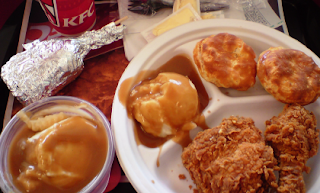Everyone working at fastfood giant KFC knows that the franchise has lost customers' trust. Now it is debuting a new program to win Americans back.
"Customers were saying, 'Your food doesn't taste the same,'" Jason Marker, KFC's US president, said last 4 April in a press event. "We're not making the food the same way the Colonel had, and we're not making food in what he described as 'the hard way.' Today marks the end of that."
The chicken chain is undergoing a process it is calling "Re-Colonelization" — a public recommitment to quality involving employee retraining and a new satisfaction guarantee.
Effective immediately, if customers aren't satisfied with their KFC order, the restaurant will remake whatever aspect of their meal fell short.
The chain has rolled out an extensive "chicken mastery certification" program, spending more than 100,000 hours retraining more than 20,000 employees. The retraining involved 43 rallies across the US, attended by more than 97 percent of restaurant general managers. National training events were also held in every KFC location in the US.
More broadly, KFC has been trying to turn business around by updating its restaurant design, with plans to remodel 3,000 locations in the next three years.
Its Colonel-centric marketing campaign, launched in 2015, is another piece of the puzzle in presenting KFC as a brand that is in touch with its culinary roots. New menu items, such as the Nashville hot chicken, have similarly emphasized the importance of creativity and well-crafted recipes.
KFC's domestic business has struggled in recent years, with Marker comparing the brand to a football team "that was once great." As rivals such as Chick-fil-A have exploded in the US, KFC hasn't been able to keep up with modern, fast-casual-influenced customer demands. According to KFC chief marketing officer Kevin Hochman, only two in five millennials have even visited the chain.
"I think it's fair to say that we haven't been living up to the standards or the philosophy of Colonel Sanders himself," Marker said.
"Customers were saying, 'Your food doesn't taste the same,'" Jason Marker, KFC's US president, said last 4 April in a press event. "We're not making the food the same way the Colonel had, and we're not making food in what he described as 'the hard way.' Today marks the end of that."
The chicken chain is undergoing a process it is calling "Re-Colonelization" — a public recommitment to quality involving employee retraining and a new satisfaction guarantee.
Effective immediately, if customers aren't satisfied with their KFC order, the restaurant will remake whatever aspect of their meal fell short.
The chain has rolled out an extensive "chicken mastery certification" program, spending more than 100,000 hours retraining more than 20,000 employees. The retraining involved 43 rallies across the US, attended by more than 97 percent of restaurant general managers. National training events were also held in every KFC location in the US.
More broadly, KFC has been trying to turn business around by updating its restaurant design, with plans to remodel 3,000 locations in the next three years.
Its Colonel-centric marketing campaign, launched in 2015, is another piece of the puzzle in presenting KFC as a brand that is in touch with its culinary roots. New menu items, such as the Nashville hot chicken, have similarly emphasized the importance of creativity and well-crafted recipes.
KFC's domestic business has struggled in recent years, with Marker comparing the brand to a football team "that was once great." As rivals such as Chick-fil-A have exploded in the US, KFC hasn't been able to keep up with modern, fast-casual-influenced customer demands. According to KFC chief marketing officer Kevin Hochman, only two in five millennials have even visited the chain.
"I think it's fair to say that we haven't been living up to the standards or the philosophy of Colonel Sanders himself," Marker said.


No comments:
Post a Comment